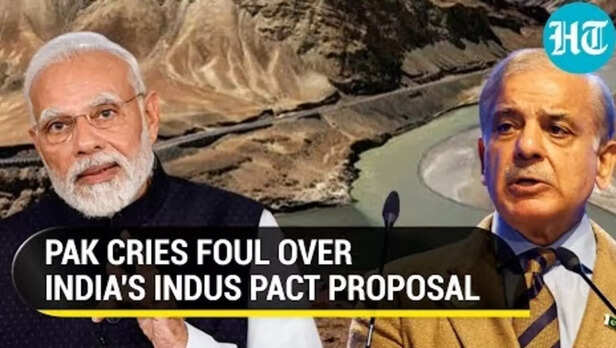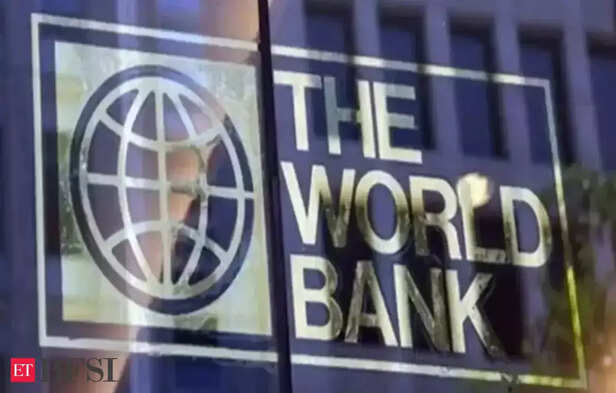Pakistan Faces Growing Crisis, "Pleads" with India to Resume Water Supply
Nidhi | May 15, 2025, 15:28 IST

( Image credit : Times Life Bureau )
Amid escalating water shortages and agricultural distress, Pakistan urgently appeals to India to resume water supply under the Indus Waters Treaty. The suspension of river flows following rising tensions has triggered a severe crisis affecting millions. This article explores the impact, background, and ongoing diplomatic struggle over one of South Asia’s most vital water agreements.
As the India-Pakistan war escalates following the deadly Pahalgam terror attack, diplomatic cracks are widening. In a dramatic turn of events, Pakistan has formally pleaded with India to reconsider its decision to suspend the Indus Waters Treaty (IWT) — a historic water-sharing accord that has survived multiple wars, but not this one.
India's move to place the treaty "in abeyance" came a day after the April 22 terror strike in Jammu & Kashmir’s Pahalgam — allegedly backed by Pakistan — killed 26 civilians, most of them tourists. For the first time in the six-decade history of the World Bank-brokered agreement, India has choked the western rivers that flow into Pakistan, weaponising water in retaliation for bloodshed.
Pakistan, now facing the dual strain of war and water scarcity, is asking for a reset — but India isn't blinking. 
Trigger: The Pahalgam Attack
On April 22, 2025, a terror attack in Pahalgam claimed the lives of 26 civilians. Intelligence traced the attack back to Pakistani soil, leading India to retaliate not just militarily — via Operation Sindoor — but diplomatically and hydrologically as well.
Cabinet Committee on Security (CCS) Decision
Chaired by Prime Minister Narendra Modi, the CCS decided to suspend the IWT, citing national security concerns. It marked the first-ever suspension of the treaty since its signing in 1960.
PM Modi’s Doctrine
“Water and blood cannot flow together,” Modi declared, reinforcing the stance that terror and dialogue are mutually exclusive. India's policy now includes cutting off not just talks and trade, but also rivers. 
Formal Appeal from Islamabad
Pakistan’s Ministry of Water Resources, led by Syed Ali Murtaza, sent a letter to India’s Jal Shakti Ministry Secretary, Debashree Mukherjee. The message: reconsider the suspension before it triggers a domestic humanitarian and economic crisis.
Crisis Warning
The letter warned that halting river flows into Pakistan could devastate agriculture, reduce hydropower generation, and affect millions dependent on Indus basin waters.
"An Attack on the People of Pakistan"
Islamabad termed the suspension equivalent to an attack, arguing that ordinary citizens, not policymakers, would suffer the most. Signed in 1960
Brokered by the World Bank, the treaty was signed between Jawaharlal Nehru and Ayub Khan, giving India control over eastern rivers (Ravi, Beas, Sutlej) and Pakistan control over western rivers (Indus, Jhelum, Chenab).
India as the Upper Riparian
Post-Partition, India gained geographic advantage as the upper riparian. However, it still allowed Pakistan to use over 80% of the Indus basin’s waters under this treaty.
One of the Most Resilient Treaties
Despite three wars and decades of hostility, the IWT survived — until now. 
Three-Tier Strategy
Union Jal Shakti Minister CR Paatil outlined short-, mid-, and long-term plans to divert, store, and utilise Indus waters within Indian territory.
"Not a Drop Shall Go to Pakistan"
Officials claim that construction on dams, storage reservoirs, and irrigation infrastructure is being fast-tracked to ensure zero discharge across the border.
Hydrological Warfare or Legitimate Leverage?
While critics call it weaponising water, Indian authorities argue that under Article III(2) of the treaty, India was never obliged to allow unutilised flows to continue indefinitely. 
No, Says World Bank Chief
In response to media speculation, World Bank President Ajay Banga clarified that the institution has no role beyond facilitation, putting to rest hopes of a third-party resolution. Agricultural Dependence
Nearly 90% of Pakistan's agriculture relies on irrigation from the Indus basin. A prolonged water blockade could lead to crop failures, food inflation, and rural unrest.
Energy Crisis Looming
Major Pakistani hydropower projects like Mangla and Tarbela dams depend on steady water flow. Reduced input could trigger blackouts and economic slowdowns.
Public Health and Sanitation
Cities like Lahore and Karachi could face clean water shortages, leading to public health emergencies in an already strained system. This is not just about rivers — it’s about redefining red lines. India’s suspension of the Indus Waters Treaty represents a strategic escalation, one that shifts the rules of engagement between the two nuclear-armed neighbours. Pakistan’s plea comes not out of diplomacy but desperation — as water, war, and warning signals all converge.
Whether India responds with flexibility or further firmness remains to be seen. But one thing is clear: the rivers are now as political as the borders they cross.
Explore the latest trends and tips in Health & Fitness, Travel, Life Hacks, Fashion & Beauty, and Relationships at Times Life!
India's move to place the treaty "in abeyance" came a day after the April 22 terror strike in Jammu & Kashmir’s Pahalgam — allegedly backed by Pakistan — killed 26 civilians, most of them tourists. For the first time in the six-decade history of the World Bank-brokered agreement, India has choked the western rivers that flow into Pakistan, weaponising water in retaliation for bloodshed.
Pakistan, now facing the dual strain of war and water scarcity, is asking for a reset — but India isn't blinking.
Why India Suspended the Indus Waters Treaty

Indus Water
( Image credit : Times Life Bureau )
Trigger: The Pahalgam Attack
On April 22, 2025, a terror attack in Pahalgam claimed the lives of 26 civilians. Intelligence traced the attack back to Pakistani soil, leading India to retaliate not just militarily — via Operation Sindoor — but diplomatically and hydrologically as well.
Cabinet Committee on Security (CCS) Decision
Chaired by Prime Minister Narendra Modi, the CCS decided to suspend the IWT, citing national security concerns. It marked the first-ever suspension of the treaty since its signing in 1960.
PM Modi’s Doctrine
“Water and blood cannot flow together,” Modi declared, reinforcing the stance that terror and dialogue are mutually exclusive. India's policy now includes cutting off not just talks and trade, but also rivers.
What Pakistan Is Saying Now

Importance of Indus water Treaty for Pakistan Economy
( Image credit : Times Life Bureau )
Formal Appeal from Islamabad
Pakistan’s Ministry of Water Resources, led by Syed Ali Murtaza, sent a letter to India’s Jal Shakti Ministry Secretary, Debashree Mukherjee. The message: reconsider the suspension before it triggers a domestic humanitarian and economic crisis.
Crisis Warning
The letter warned that halting river flows into Pakistan could devastate agriculture, reduce hydropower generation, and affect millions dependent on Indus basin waters.
"An Attack on the People of Pakistan"
Islamabad termed the suspension equivalent to an attack, arguing that ordinary citizens, not policymakers, would suffer the most.
Understanding the Indus Waters Treaty
Brokered by the World Bank, the treaty was signed between Jawaharlal Nehru and Ayub Khan, giving India control over eastern rivers (Ravi, Beas, Sutlej) and Pakistan control over western rivers (Indus, Jhelum, Chenab).
India as the Upper Riparian
Post-Partition, India gained geographic advantage as the upper riparian. However, it still allowed Pakistan to use over 80% of the Indus basin’s waters under this treaty.
One of the Most Resilient Treaties
Despite three wars and decades of hostility, the IWT survived — until now.
India’s New Water Doctrine

Indus River
( Image credit : Times Life Bureau )
Three-Tier Strategy
Union Jal Shakti Minister CR Paatil outlined short-, mid-, and long-term plans to divert, store, and utilise Indus waters within Indian territory.
"Not a Drop Shall Go to Pakistan"
Officials claim that construction on dams, storage reservoirs, and irrigation infrastructure is being fast-tracked to ensure zero discharge across the border.
Hydrological Warfare or Legitimate Leverage?
While critics call it weaponising water, Indian authorities argue that under Article III(2) of the treaty, India was never obliged to allow unutilised flows to continue indefinitely.
Can the World Bank Intervene?

World Bank
( Image credit : Times Life Bureau )
No, Says World Bank Chief
In response to media speculation, World Bank President Ajay Banga clarified that the institution has no role beyond facilitation, putting to rest hopes of a third-party resolution.
What’s at Stake for Pakistan?
Nearly 90% of Pakistan's agriculture relies on irrigation from the Indus basin. A prolonged water blockade could lead to crop failures, food inflation, and rural unrest.
Energy Crisis Looming
Major Pakistani hydropower projects like Mangla and Tarbela dams depend on steady water flow. Reduced input could trigger blackouts and economic slowdowns.
Public Health and Sanitation
Cities like Lahore and Karachi could face clean water shortages, leading to public health emergencies in an already strained system.
A Tipping Point in Bilateral Relations
Whether India responds with flexibility or further firmness remains to be seen. But one thing is clear: the rivers are now as political as the borders they cross.
Explore the latest trends and tips in Health & Fitness, Travel, Life Hacks, Fashion & Beauty, and Relationships at Times Life!
